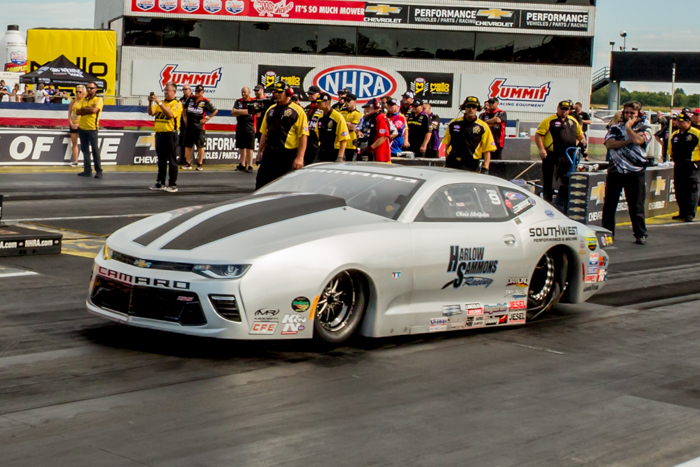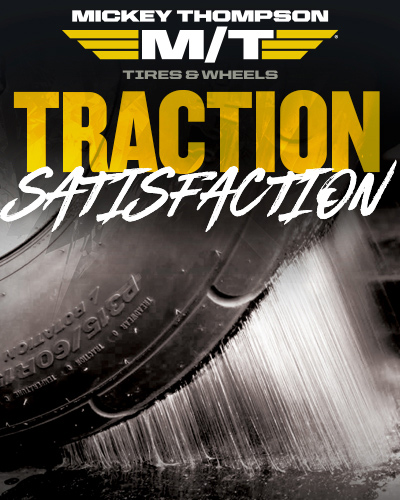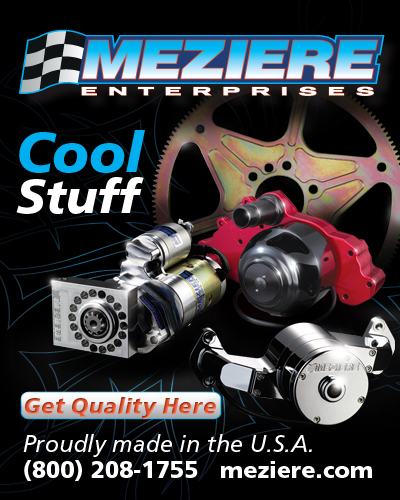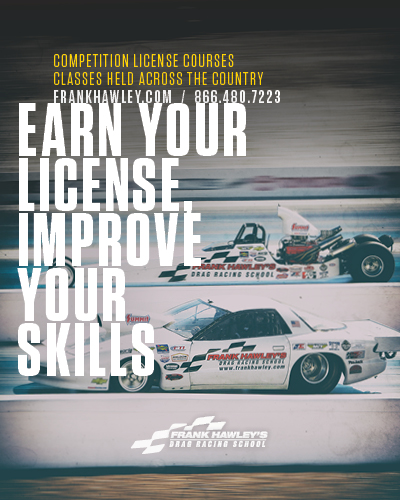McGAHA KEEPS EYE ON PRO STOCK CHANGES
 The NHRA is expected to announce at season’s end that the Pro Stock class is headed for an 18-race schedule in 2019, and some racers have said they’d welcome that.
The NHRA is expected to announce at season’s end that the Pro Stock class is headed for an 18-race schedule in 2019, and some racers have said they’d welcome that.
A shorter schedule seems to work for the Pro Stock Motorcycle and Pro Modified classes. So it might be a blessing for the beleaguered class, which has undergone several radical and expensive changes lately.
Greg Anderson isn’t convinced, based on his terse reaction at the recent Las Vegas race. But he elaborated earlier this week: “It’s still my belief that it’s the class with the best competition. This year was the best competition we’ve ever had. It was off the charts this year. You can’t make any mistakes if you want to win, and it’s harder than ever to win a race. But I love that. The taller the challenge, the better I like it. It’s why I race in the class. When people ask why I race Pro Stock, it’s for the competition. No matter what happens, the class is still going to have great competition.”
With Mountain Motor Pro Stock racers not being integrated into the class and NHRA (partly through no fault of its own) unable to contain costs significantly for any category, more racers might find the arrangement more affordable with a slightly shorter schedule. Matt Hartford, Vincent Nobile, and Elite Performance team owner and occasional driver Richard Freeman are on board.
The debate about the health of Pro Stock surely will continue in the off-season about this latest tweak to the Pro Stock class that is losing 2017 champion Bo Butner, heir-apparent Tanner Gray, rising star Drew Skillman, and grinder John Gaydosh for a variety of reasons.
Chris McGaha, one of the class’ most outspoken owner-drivers, has his ideas about the state of Pro Stock and its future – which he shared before the second version of the NHRA’s 16-race proposal became public fodder.
The Harlow Sammons Camaro driver from Odessa, Texas, had announced earlier this season that he was planning to pare back his schedule. So his blueprint of “probably about 15 or 16” appearances might work nicely for him.
“That’s all I’d planned on the whole time,” McGaha said. “I did a little more in ’17, but yeah, it’s probably 15 or 16 - especially since they ain’t going to screw it up too bad with the Mountain Motor.”
The notion that the sanctioning body would invite the Mountain Motor contingent to blend into the class was confusing, considering it had forced Pro Stock teams to trade their carburetors for electronic fuel injection systems and remove their telltale hood scoops – at tremendous cost increases and time investments.
“Trust me, we told them the same thing,” McGaha said. “We did – I don’t know if anybody else in Pro Stock did, but we did.”
His suggestion to the Powers That Be sounded like a move toward possibly combining the best qualities of the Pro Stock and increasingly popular Factory Stock Showdown classes.
“Well, what they need to do is, is what we keep – Harlow Sammons keeps – telling them to do, is do the COPO motors, DragPak all that. They need to put those motors in these cars,” he said. “If they want to try to change it for the better and get the factories back involved, that’s the only step they can take right now.”
He dismissed an official merging of the classes, saying, “I read all the crap people put on the Internet. People talk about how this-over-here rule crap: ‘Oh well a little more aero body, a little more this, a little more of that to get the cars to go faster.’ If you’re not going to allow Factory Showdown the rule creep, they’re going to be as fast as they are right now. They may get to 7.70’s one day, but they ain’t going to ever get to the 6s, unless you let them rule creep, like we did.”
He indicated the issue isn’t that the average fan is concerned about cars going fast or cars looking more like what they have in their driveways.
What to expect of NHRA Pro Stock in 2019. https://t.co/COTSnB1LRH
— Competition Plus (@competitionplus) November 8, 2018

“And that’s the honest-to-God truth,” he said, “because I have tons of people come up to the rope: ‘I miss the scoop.’ I have tons of people walk up, ‘I love it without the scoop on there.’ I have tons of people walk up: ‘Well we need Fords out here.’ ‘OK, yes, we probably do.’ I hear people all the time, ‘Well, I hate Pro Stock.’ Good for you. Other people walk up and say they love Pro Stock. That’s the beauty of living in America.
“But what is real bad is how much influence a lot of people who have no skin in the game seem to have - who have no investment, who have nothing to lose or gain from this,” McGaha said.
Every change to class rules has cost a huge chunk of change. And McGaha said he has calculated that his team averages “$10,000 a race, just in expenses moving the rig around – moving the rig here, getting hotels, flying everybody. That’s just that expense. That’s not paying people. I mean, it costs a lot of money and that’s what people don’t understand. The car is the least expensive thing. It’s the people it takes to run 24 races. It’s moving your truck and trailer around for 24 races. That’s what costs the money. The car is cheap. Relatively speaking, the car is cheap. It really is. That’s like third or fourth down the list of line items of expense. I’m the most trimmed back team out here and we know for a fact we average $10,000 a race.”
Compounding the problem for McGaha in particular is the fact he does not live close to most racetracks. Texas Motorplex, at Ennis, near Dallas, is a full day’s drive. Wild Horse Pass Motorsports Park on the southern outskirts of Phoenix, at Chandler, Ariz., is slightly farther away from Odessa than Houston is. So of the 21 different racetracks, only three are geographically quick to travel to, and they don’t include the three venues the Mello Yello Series visits twice (Pomona, Las Vegas, and Charlotte).
At the mention of money, he said, “That’s all it all’s about. It’s all about cost in the end. It really is. It doesn’t matter if it’s Pro Stock or Top Fuel or Super Gas, it’s all about the money in the end.”
Money is the primary reason Gaydosh has called it quits. But in his absence and those of Butner, Gray, and Skillman, others are set to fill the void, including Matt Smith and Fernando Cuadra’s son(s). And for the Mike Edwardses, the Allen Johnsons, the Ron Krishers, the Warren Johnsons and Kurt Johnsons, the Larry Morgans, the Shane Grays, the V Gaineses, the Greg Stanfields, the Rodger Brogdons, and the Steve Kents – fulltime racers who have left the class in the past five years or so – a 16-race schedule might ensure that the Alan Prusienskys, the Val Smelands, the Kenny Delcos, the Fernando Cuadras, the Matt Hartfords, and the John Gaydoshes stay out there.
“You’re going to have a few people leaving. You’re going to have a few people come. And that’s the problem,” McGaha said. “Again, something I’ve stated on the Internet, even Pro Mod and some of the others, Pro Stock’s had a changeover and when we had a changeover of people, we didn’t have enough people come back in return. I seen the same thing on Pro Mod. In 2008– there was only one guy that was racing in 2008 that’s racing today.”
He said Danny Rowe is the lone racer who was in the mix as far back as 2008.
“If you go look at the list from Gainesville 2008 to this year at Gainesville, he’s the only guy that was on both lists. And there’s guys on that list that I was like, ‘I forgot about that guy. What ever happened to that guy?’ There was a ton of them on that list that I had totally, as soon as I read their name, I’m like ‘I wonder what happened to that guy.’ So they have a changeover. Is their changeover going to be like ours and get nobody coming back in?” McGaha asked. “You know, we had a lot of people leave around 2011 to ’13 and we just didn’t have enough people come back.”
The time investment for a team is substantial, too.
“That’s what people don’t understand about doing this,” McGaha said. “A guy like myself, I have to spend 48 days a year in an airport. I spend Thursday and I spend the Monday in the airport – 48 days a year in the airport. You lose 48 days of your life in an airport a year racing this.”
For McGaha, his suspicion about any technical funny-business has added to his budget. He volunteered to purchase all the racing fuel for the entire class at every race this year.
As the season wound down, he said he “absolutely” thinks it was worth it and is not at all sorry: “Absolutely was the best thing we ever did.”
He estimated the cost was “close to a grand a race. It’s like a drum a race, maybe a drum and a half. It may be less. When they put injection on them, they don’t burn near as much gas when they’re sitting idling. Ours doesn’t, at least. Some of the others may. Ours doesn’t.” Then, rather tongue-in-cheek, he said, “Maybe that’s what NHRA knew – they were trying to save us money because they knew we weren’t going to burn as much fuel.”
McGaha said he’s undecided whether he’ll continue to buy fuel for the entire class next season.
“I don’t know. We’re going to talk about that. We may. I mean, we’re going to finish the year up, but we may talk about it next year. I don’t know,” he said.
Given the expenses and the occasional aggravation, it’s hard, in a sense, to justify why he subjects himself to it. So why does Chris McGaha race?
“That is a really good question at this point,” he said. “Originally I loved doing it, loved the competition. And I guess that’s the only thing that keeps me out here. It sure ain’t the money, never was. Never was.
“But at the same time, you got to stop the bleeding somehow,” he said.





































